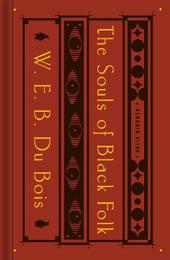
|
The Souls of Black Folk: With "The Talented Tenth" and "The Souls of White Folk"
Hardback
Main Details
| Title |
The Souls of Black Folk: With "The Talented Tenth" and "The Souls of White Folk"
|
| Authors and Contributors |
By (author) W. E. B. Du Bois
|
|
Introduction by Ibram X. Kendi
|
|
Notes by Monica E. Elbert
|
| Series | Penguin Vitae |
|---|
| Physical Properties |
| Format:Hardback | | Pages:288 | | Dimensions(mm): Height 204,Width 134 |
|
| Category/Genre | General encyclopaedias
Western philosophy - c 1600 to c 1900 |
|---|
| ISBN/Barcode |
9780143134435
|
| Classifications | Dewey:323.092 |
|---|
| Audience | |
|---|
| Illustrations |
FOIL STAMPING ON COVER; COLORED ENDPAPERS
|
|
Publishing Details |
| Publisher |
Penguin Putnam Inc
|
| Imprint |
Penguin Classics
|
| Publication Date |
23 February 2021 |
| Publication Country |
United States
|
Description
The landmark book about being black in America, now in an expanded edition commemorating the 150th anniversary of W. E. B. Du Bois's birth and featuring a new introduction by Ibram X. Kendi, the National Book Award-winning author of Stamped from the Beginning- The Definitive History of Racist Ideas in America and How to Be an Antiracist A collectible hardcover edition of the landmark book about being black in America, featuring an introduction by Ibram X. Kendi, the #1 New York Times bestselling author of How to Be an Antiracist A Penguin Vitae Edition When The Souls of Black Folk was first published in 1903, it had a galvanizing effect on the conversation about race in America--and it remains both a touchstone in the literature of African America and a beacon in the fight for civil rights. Believing that one can know the "soul" of a race by knowing the souls of individuals, W. E. B. Du Bois combines history and stirring autobiography to reflect on the magnitude of American racism and to chart a path forward against oppression, and introduces the now-famous concepts of the color line, the veil, and double-consciousness. Penguin Vitae--loosely translated as "Penguin of one's life"--is a deluxe hardcover series from Penguin Classics celebrating a dynamic and diverse landscape of classic fiction and nonfiction from seventy-five years of classics publishing. Penguin Vitae provides readers with beautifully designed classics that have shaped the course of their lives, and welcomes new readers to discover these literary gifts of personal inspiration, intellectual engagement, and creative originality.
Author Biography
William Edward Burghardt Du Bois (1868-1963) was born in Great Barrington, Massachusetts. A sociologist, historian, poet, and writer of several novels, Du Bois was one of the main founders of the National Association for the Advancement of Colored People. He was a lifelong critic of American society and an advocate of black people against racial injustice. He spent his last years in Ghana, where he died in exile at the age of ninety-five. Ibram X. Kendi (introduction) is the author of the New York Times bestseller How to Be an Antiracist; the #1 New York Times bestseller Stamped- Racism, Antiracism, and You (with Jason Reynolds); and the New York Times bestseller Stamped from the Beginning- The Definitive History of Racist Ideas in America, for which he became the youngest ever winner of the National Book Award for Nonfiction. A contributing writer at The Atlantic, and a professor of history and international relations and the founding director of the Antiracist Research and Policy Center at American University, he lives in Washington, DC.
Reviews"I was assigned this book of essays in college and it was transformative for me as a person and a writer. Du Bois captures the complexity and the interiority of what it's like to be black in the United States, and even though it was written more than a century ago, the way Du Bois writes makes it feel like he wrote this book last year." -Tomi Adeyemi, #1 New York Times bestselling author of Children of Blood and Bone, in the Good Morning America Book Club "A work that is still relevant today . . . Vividly depict[s] what it was like to be black . . . Many of the ideas that Du Bois outlined in the book still endure. . . . [A book] for anyone who wants to understand America." -Lynn Neary, NPR's Morning Edition "[The Souls of Black Folk is] the foundation on which Du Bois built a lifetime of ideas, and on which the black and antiracist intelligentsia continues to build today. . . . In 1903 . . . black newspapers . . . typically shouted in unison, 'SHOULD BE READ AND STUDIED BY EVERY PERSON, WHITE AND BLACK.' . . . And today it still SHOULD BE READ AND STUDIED BY EVERY PERSON." -Ibram X. Kendi, from the Introduction
|